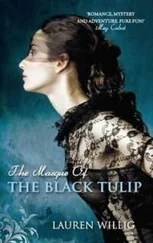Alexandre Dumas - The Black Tulip
Здесь есть возможность читать онлайн «Alexandre Dumas - The Black Tulip» — ознакомительный отрывок электронной книги совершенно бесплатно, а после прочтения отрывка купить полную версию. В некоторых случаях можно слушать аудио, скачать через торрент в формате fb2 и присутствует краткое содержание. Жанр: literature_19, foreign_antique, foreign_prose, на английском языке. Описание произведения, (предисловие) а так же отзывы посетителей доступны на портале библиотеки ЛибКат.
- Название:The Black Tulip
- Автор:
- Жанр:
- Год:неизвестен
- ISBN:нет данных
- Рейтинг книги:5 / 5. Голосов: 1
-
Избранное:Добавить в избранное
- Отзывы:
-
Ваша оценка:
- 100
- 1
- 2
- 3
- 4
- 5
The Black Tulip: краткое содержание, описание и аннотация
Предлагаем к чтению аннотацию, описание, краткое содержание или предисловие (зависит от того, что написал сам автор книги «The Black Tulip»). Если вы не нашли необходимую информацию о книге — напишите в комментариях, мы постараемся отыскать её.
The Black Tulip — читать онлайн ознакомительный отрывок
Ниже представлен текст книги, разбитый по страницам. Система сохранения места последней прочитанной страницы, позволяет с удобством читать онлайн бесплатно книгу «The Black Tulip», без необходимости каждый раз заново искать на чём Вы остановились. Поставьте закладку, и сможете в любой момент перейти на страницу, на которой закончили чтение.
Интервал:
Закладка:
“Gentlemen,” Bowelt repeated for the second time, “I assure you that in this moment I am here alone with Mynheer d’Asperen, and I cannot take any resolution on my own responsibility.”
“The order! we want the order!” cried several thousand voices.
Mynheer Bowelt wished to speak, but his words were not heard, and he was only seen moving his arms in all sorts of gestures, which plainly showed that he felt his position to be desperate. When, at last, he saw that he could not make himself heard, he turned round towards the open window, and called Mynheer d’Asperen.
The latter gentleman now made his appearance on the balcony, where he was saluted with shouts even more energetic than those with which, ten minutes before, his colleague had been received.
This did not prevent him from undertaking the difficult task of haranguing the mob; but the mob preferred forcing the guard of the States – which, however, offered no resistance to the sovereign people – to listening to the speech of Mynheer d’Asperen.
“Now, then,” the young man coolly remarked, whilst the crowd was rushing into the principal gate of the Town-hall, “it seems the question will be discussed indoors, Captain. Come along, and let us hear the debate.”
“Oh, Monseigneur! Monseigneur! take care!”
“Of what?”
“Among these deputies there are many who have had dealings with you, and it would be sufficient, that one of them should recognize your Highness.”
“Yes, that I might be charged with having been the instigator of all this work, indeed, you are right,” said the young man, blushing for a moment from regret of having betrayed so much eagerness. “From this place we shall see them return with or without the order for the withdrawal of the dragoons, then we may judge which is greater, Mynheer Bowelt’s honesty or his courage.”
“But,” replied the officer, looking with astonishment at the personage whom he addressed as Monseigneur, “but your Highness surely does not suppose for one instant that the deputies will order Tilly’s horse to quit their post?”
“Why not?” the young man quietly retorted.
“Because doing so would simply be signing the death warrant of Cornelius and John de Witt.”
“We shall see,” his Highness replied, with the most perfect coolness; “God alone knows what is going on within the hearts of men.”
The officer looked askance at the impassible figure of his companion, and grew pale: he was an honest man as well as a brave one.
From the spot where they stood, his Highness and his attendant heard the tumult and the heavy tramp of the crowd on the staircase of the Town-hall. The noise thereupon sounded through the windows of the hall, on the balcony of which Mynheers Bowelt and D’Asperen had presented themselves. These two gentlemen had retired into the building, very likely from fear of being forced over the balustrade by the pressure of the crowd.
After this, fluctuating shadows in tumultuous confusion were seen flitting to and fro across the windows: the council hall was filling.
Suddenly the noise subsided, and as suddenly again it rose with redoubled intensity, and at last reached such a pitch that the old building shook to the very roof.
At length, the living stream poured back through the galleries and stairs to the arched gateway, from which it was seen issuing like waters from a spout.
At the head of the first group, man was flying rather than running, his face hideously distorted with satanic glee: this man was the surgeon Tyckelaer.
“We have it! we have it!” he cried, brandishing a paper in the air.
“They have got the order!” muttered the officer in amazement.
“Well, then,” his Highness quietly remarked, “now I know what to believe with regard to Mynheer Bowelt’s honesty and courage: he has neither the one nor the other.”
Then, looking with a steady glance after the crowd which was rushing along before him, he continued, —
“Let us now go to the Buytenhof, Captain; I expect we shall see a very strange sight there.”
The officer bowed, and, without making any reply, followed in the steps of his master.
There was an immense crowd in the square and about the neighbourhood of the prison. But the dragoons of Tilly still kept it in check with the same success and with the same firmness.
It was not long before the Count heard the increasing din of the approaching multitude, the first ranks of which rushed on with the rapidity of a cataract.
At the same time he observed the paper, which was waving above the surface of clenched fists and glittering arms.
“Halloa!” he said, rising in his stirrups, and touching his lieutenant with the knob of his sword; “I really believe those rascals have got the order.”
“Dastardly ruffians they are,” cried the lieutenant.
It was indeed the order, which the burgher guard received with a roar of triumph. They immediately sallied forth, with lowered arms and fierce shouts, to meet Count Tilly’s dragoons.
But the Count was not the man to allow them to approach within an inconvenient distance.
“Stop!” he cried, “stop, and keep off from my horse, or I shall give the word of command to advance.”
“Here is the order!” a hundred insolent voices answered at once.
He took it in amazement, cast a rapid glance on it, and said quite aloud, —
“Those who have signed this order are the real murderers of Cornelius de Witt. I would rather have my two hands cut off than have written one single letter of this infamous order.”
And, pushing back with the hilt of his sword the man who wanted to take it from him, he added, —
“Wait a minute, papers like this are of importance, and are to be kept.”
Saying this, he folded up the document, and carefully put it in the pocket of his coat.
Then, turning round towards his troop, he gave the word of command, —
“Tilly’s dragoons, wheel to the right!”
After this, he added, in an undertone, yet loud enough for his words to be not altogether lost to those about him, —
“And now, ye butchers, do your work!”
A savage yell, in which all the keen hatred and ferocious triumph rife in the precincts of the prison simultaneously burst forth, and accompanied the departure of the dragoons, as they were quietly filing off.
The Count tarried behind, facing to the last the infuriated populace, which advanced at the same rate as the Count retired.
John de Witt, therefore, had by no means exaggerated the danger, when, assisting his brother in getting up, he hurried his departure. Cornelius, leaning on the arm of the Ex-Grand Pensionary, descended the stairs which led to the courtyard. At the bottom of the staircase he found little Rosa, trembling all over.
“Oh, Mynheer John,” she said, “what a misfortune!”
“What is it, my child?” asked De Witt.
“They say that they are gone to the Town-hall to fetch the order for Tilly’s horse to withdraw.”
“You do not say so!” replied John. “Indeed, my dear child, if the dragoons are off, we shall be in a very sad plight.”
“I have some advice to give you,” Rosa said, trembling even more violently than before.
“Well, let us hear what you have to say, my child. Why should not God speak by your mouth?”
“Now, then, Mynheer John, if I were in your place, I should not go out through the main street.”
“And why so, as the dragoons of Tilly are still at their post?”
“Yes, but their order, as long as it is not revoked, enjoins them to stop before the prison.”
“Undoubtedly.”
“Have you got an order for them to accompany you out of the town?”
“We have not?”
“Well, then, in the very moment when you have passed the ranks of the dragoons you will fall into the hands of the people.”
Читать дальшеИнтервал:
Закладка:
Похожие книги на «The Black Tulip»
Представляем Вашему вниманию похожие книги на «The Black Tulip» списком для выбора. Мы отобрали схожую по названию и смыслу литературу в надежде предоставить читателям больше вариантов отыскать новые, интересные, ещё непрочитанные произведения.
Обсуждение, отзывы о книге «The Black Tulip» и просто собственные мнения читателей. Оставьте ваши комментарии, напишите, что Вы думаете о произведении, его смысле или главных героях. Укажите что конкретно понравилось, а что нет, и почему Вы так считаете.












